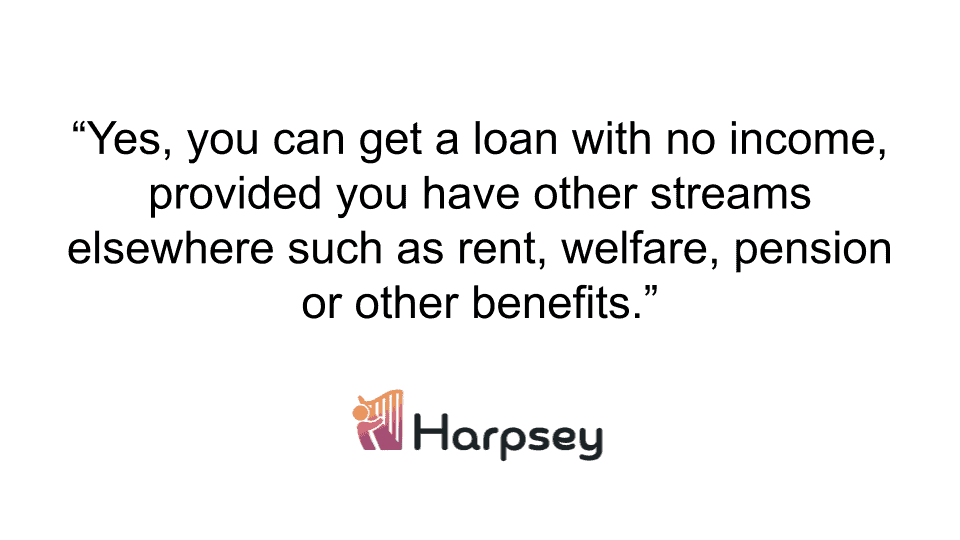Yes, it is possible to get a loan with no income. If you are struggling with unemployment, you are not alone. It is estimated that 5.8 million Americans are unemployed in 2023. You can use other income sources, whether it is alimony, welfare, interest, or pension, as eligibility for certain loans. You could also potentially use your car, or equity in your home, as collateral for a secured loan.
However, if you have none of them above, you should also look at products such as Universal Credit or a credit union. This guide aims to explain your loan options if you have no income, as well as how you can boost your chances of approval.
What Options do I Have Be If I Need a Loan With No Income?
There are several things that can be used in lieu of income when applying for a loan. These include:
- Rent
- Welfare
- Social security benefits
- A pension or annuity
- Interest from saving products
- Child support
- Income from your spouse, partner, wife, husbands, or parents
- Disability benefits
- Dividends from a company
Why Might You Have No Income?
You may find yourself in a position where a financial emergency has arisen and you need a loan, but presently do not have a job or income. However, depending on the product and your personal history, you may still be eligible for a loan. You may have no source of income because:
- You are unemployed
- You cannot work for health reasons
- You are between jobs
- You are new to a country
- You are about to begin a new job
- You are retired
- You are recently divorced
Does Having An Income Help You to Get a Loan?
Yes. For mainstream loan products such as personal loans, credit cards, and mortgages, having employment and a stable source of income is essential. This can help you borrow anything from $500 to $50,000 at affordable rates of interest.
If you do not have an income, you may turn to alternative products such as using valuable collateral (secured loans), selling items through pawning , or paying higher rates of interest through payday loans.
Can You Get a Loan With No Income and No Job?
Yes. It is possible to find a loan when you have no income and no job. However, your options may be limited to products that require you to use collateral. Further, you may also have to find alternative forms of income as proof that you are able to repay the loan on time.
Loan companies need to know that if they lend money, they will get that money back with interest. So it is essential that you provide proof that you can afford to repay a loan. For some people, this proof means having a history of good credit, a spouse who has a stable income, or income through other means such as benefits, welfare, a pension, and more.
However, having a job (part-time or full-time) and a stable income, ideally combined with a good credit score, will open you up to more opportunities when you are looking to be financed.
How Can I Boost My Chances of Getting a Loan With No Income?
If you are currently without income, there are some lenders who will still consider you, particularly if you are retired or married without a stable source of income yourself.
It can further help your application if you are a joint homeowner on a property. This is because the lender believes that you could sell the property, use its equity, or get a loan against the property in order to fulfill any repayments.
Having a good credit score will always help. This is because credit score is the best indication of how well you have managed other forms of debt, loans, or credit cards in the past. For example, you may have a very positive, extensive financial history but may be between jobs at the present moment.
What Types of Loans Do Not Require Income?
There are several types of loans that do not require income verification. Below is a list of examples:
- Borrowing from friends and family. Asking for money for a parent, sibling or close friend is often the simplest way to get money quickly, regardless of whether you have a job or a source of income. Borrowing from family and friends can be a reasonable option if you need quick access to cash. However it is important that the terms of repayment are clearly set out so that any misunderstanding is avoided.
- Title Loans. Title loans involve temporarily selling the ‘title’ of your car to a lender- so that you can receive 25% to 50% of the car’s value upfront as a loan. However, it is very important to make repayments on time, otherwise you risk your car being repossessed.
- Secured Loans. Secured loans are where your loan is secured against something valuable that you own. Valuables can take the form of a car, home, or other valuable item. The interest rates tend to be low with secured loans, since you have something of value as collateral. It is important, however, to repay the loan in full, or you risk losing a part or whole of the asset.
- Co-signer Loans. This is where you would get someone that you know, ideally a parent, sibling or close friend, who has a stable credit score to ‘co-sign’ your loan agreement. It is important that the co-signer knows the responsibilities involved, and how they may be required to make repayment on your behalf.
- Credit Unions. Credit unions are not-for-profit organizations that look to help people of all backgrounds, including those who may have no income or very bad credit scores. You may secure a loan with these organizations with low rates. However the loan itself can take a few days to a week to process.


